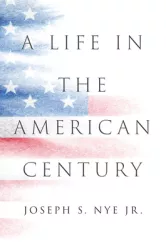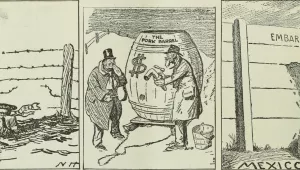Summary
In November 2008, the National Intelligence Council released Global Trends 2025 which argued that "the international system — as constructed following the Second World War — will be almost unrecognizable by 2025 owing to the rise of emerging powers, a globalizing economy, a historic transfer of relative wealth and economic power from West to East, and the growing influence of non-state actors. By 2025 the international system will be a global multipolar one with gaps in national power continuing to narrow between developed and developing countries [emphasis in original]."1 This conclusion represented a striking departure from the NIC's conclusion four years earlier in Mapping the Global Future 2020 that unipolarity was likely to remain a persistent condition of the international system.
Between the two reports America's zeitgeist had clearly shifted under the impact of persistent difficulty in the counterinsurgency wars in Iraq and Afghanistan and increased questioning of United States global leadership (at home and abroad), the seemingly inexorable rise of the newly emerging economies (suggestively labeled as the BRICs by Goldman Sachs analysts), and the global economic downturn and recession in the United States. The overall impact was the creation of a new conventional wisdom that foresees continued decline of the United States, an end to the unipolar world order that marked the post–Cold War world and a potential departure from the pursuit of US primacy that marked the foreign policies of the three presidential administrations that followed the end of the Cold War.
The debate over unipolarity and continued US primacy is not merely an academic debate. Perceptions of US power will guide both American policymakers and other nations as they consider their policy options. Primacy has underpinned US grand strategy since the end of the Cold War because no other nation was able to provide the collective public goods that have upheld the security of the international system and enabled a period of dramatically increased global economic activity and prosperity. Both the United States and the global system have benefitted from that circumstance.
The arguments for US decline are not new but before they harden into an unchallenged orthodoxy it would be good to carefully examine many of the key assumptions that undergird the emerging conventional wisdom. Will the undeniable relative decline of the United States, in fact, lead to the end of unipolarity? Do the BRIC countries really represent a bloc? What would multipolarity look like? How does one measure national power anyhow, and how can one measure the change in the power distribution globally? Is the rise of global competitors inevitable? What are some of the weaknesses that might hamper the would-be competitors from staying on their current favorable economic and political trajectory? Does the United States possess some underappreciated strengths that might serve as the basis for continued primacy in the international system and, if so, what steps would a prudent government take to extend that primacy into the future?
The history of straight-line projections of economic growth and the rise of challengers to the dominance of the United States has not been kind to those who have previously predicted US decline. It is not necessarily the case that the United States will be caught between the end of the "unipolar moment" of post–Cold War predominance and a global multipolar world. The emerging international environment is likely to be different than either of the futures forecast by the NIC in Mapping the Global Future in 2004 or Global Trends 2025 in 2008. It would seem more likely that the relative decline of American power will still leave the United States as the most powerful actor in the international system. But the economic rise of other nations and the spread of nuclear weapons in some key regions are likely to confront the US with difficult new challenges.
The revived notion of America’s decline has once again brought to the fore a question about the purposes of United States power and the value of US international primacy. Seeking to maintain America’s advantage as the prime player in the international system imposes costs on the US budget and taxpayer. It is certainly fair to ask what the United States gets from exerting the effort to remain number one. It is also worth considering what the world would look like if the United States was just one power among many, and how such perceptions might affect the strategic and policy choices national security decision-makers will face over the next twenty-odd years.
Primacy both allows the state to advance its own specific policy objectives and gives it greater freedom of action in the pursuit of those ends. Throughout most of the twentieth century American presidents have considered it to be in the US interest to seek a "liberal world order" comprised of an international economic system characterized by openness, free trade and free flows of investment, and an international political arrangement characterized by a growing number of liberal democratic states. The theory behind the continued adherence to a strategy of maintaining primacy has been that only the security provided by a strong power or group of powers can underpin the liberal economic and political order that is conducive to economic growth, representative government and international peace and prosperity. Since the end of the Cold War this view has had consistent bipartisan support.
Although the point remains controversial it seems apparent that America, while clearly creating some resentments with its policies, continues to be seen (particularly by governments) as relatively benign in its interactions with other powers. America shares a fundamental view of the world rooted in the neo-liberal orthodoxy of free markets, open societies, and democratic institutions that emerged as a consensus prescription for peace and prosperity after the collapse of communism. This "transnational liberalism" inclines national elites to see a broad confluence of interest with the United States and reduces their tendency to try and counterbalance American power. As the guarantor of the international world economy and a provider of security and stability because of its alliance system, the United States provides global public goods which others cannot provide.
Accepting the new conventional wisdom of decline and an end of US primacy could well lead to an alteration of the strategic underpinnings of American global policy and could become a self-fulfilling prophecy.
A rigorous assessment should consider the strengths and weaknesses of the United States' putative competitors on the global scene as well as the enduring strengths and sources of resilience that have enabled America to extend its primacy and maintain a stabilizing, global hegemonic role against all expectations. There is a need for a framework to inform how US policymakers might think about the problem of developing strategies and policies to extend that role yet again, since it is at least an arguable proposition that rather than a multipolar world, the global system, after the current Great Recession passes, will continue to be unipolar but with some additional challenges for US leadership.
The 2008 NIC report reflected a wave of "declinism" — the belief that American power is on the wane, that other powers are rising, particularly the so-called BRICs (Brazil, Russia, India and China) and that the United States needs to adjust its international ambitions and eschew continued primacy in favor of accommodating the rising powers in the interest of greater global governance. Ideas about American decline can cut two ways. They can predispose policymakers to pursue policies that actually accelerate decline or they can spark leaders to pursue courses of action that renew American economic vitality in order to reverse decline....
To continue reading, download the complete report below.
Edelman, Eric. “Understanding America's Contested Primacy.” Center for Strategic and Budgetary Assessments, 2010
The full text of this publication is available via Center for Strategic and Budgetary Assessments.




